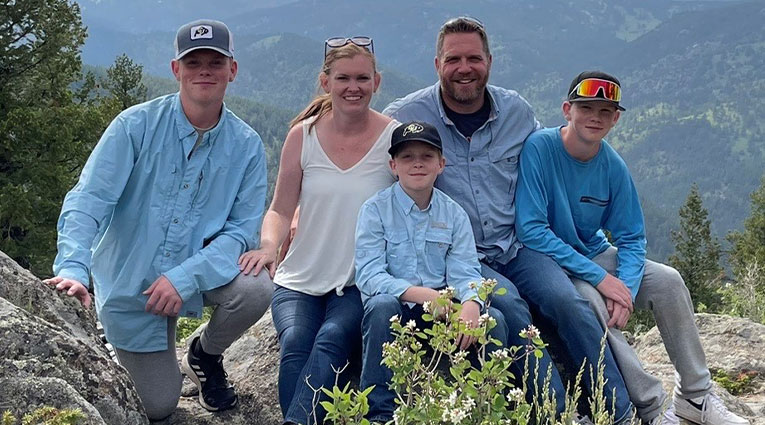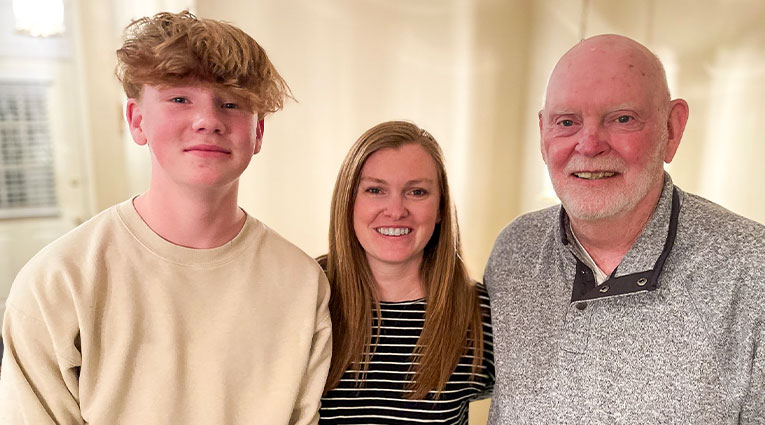Some families have secrets that are kept in the darkness. Others have medical mysteries lurking in the branches of their family tree.
One of those medical mysteries started unfolding for Sarah Anderson when she was an otherwise healthy 12-year-old girl.
It was 1994, and out of nowhere, she collapsed suddenly at her mother's feet in cardiac arrest. Her father, a trained paramedic, quickly performed CPR.
Fortunes were on Sarah's side that day. An ambulance happened to be right nearby in her neighborhood. The squad kickstarted her heart. Sarah survived, but no one knew what exactly went wrong.
Electrocardiogram (EKG) testing showed abnormal electrical signals in Sarah's heart. But her heart's structure was fine. Doctors diagnosed her with primary electrical disease and implanted a defibrillator to help control her heartbeat.
The heartbeat mystery reaches a second generation
Years later, Sarah would learn her initial diagnosis was incorrect. Her second son, Noah, was born with a hole between the lower two chambers inside his heart. It's a congenital heart disorder known as a ventricular septal defect.
At just one year old, Noah was undergoing routine EKG monitoring when doctors discovered his heart rhythm mimicked Sarah's.
Further testing – including a heart ultrasound – would reveal Noah had
hypertrophic cardiomyopathy (HCM). This inherited condition thickens the heart muscle and reduces its ability to pump blood. Another echocardiogram confirmed Sarah also had HCM.
“At that point, the doctors said hypertrophic cardiomyopathy was my family's diagnosis," she says. “Genetic testing revealed that I and several members of my family have the same mutation that causes this condition."

As Sarah's condition progressed, her doctor referred her to The Christ Hospital. Now, she receives the most advanced care from heart failure specialist
Ankit Bhatia, MD, associate medical director of the
Hypertrophic Cardiomyopathy Care Team.
Recognizing hypertrophic cardiomyopathy (HCM)
The HCM diagnosis doctors gave Sarah and Noah is relatively common. The condition
affects 1 in 300-500 Americans, and it's the most common inherited heart condition nationwide. It is characterized by a genetically mediated thickening of the heart walls.
HCM comes in multiple forms based on whether the heart thickening restricts (obstructive) or doesn't restrict (nonobstructive) blood flow from exiting the heart. Untreated HCM can also lead to
atrial fibrillation (AFib) and congestive heart failure (CHF). In rare cases, it can also cause sudden cardiac death. So, it is a condition that requires vigilance for early detection and treatment.
But, recognizing HCM can be difficult because patients don't always have symptoms. Signs that do emerge, like the shortness of breath Sarah felt, can be confused with other conditions like heart failure. Common HCM signs include:
- Abnormal heartbeat (faster, irregular, stronger)
- Chest pain, particularly with physical activity
- Dizziness or lightheadedness
- Fainting
- Fatigue
- Shortness of breath
Genetic testing revealed Sarah's high risk for HCM and showed she carried a mutation to the tropomyosin gene that regulates how muscle fibers tense and contract. "We were able to work backwards and discover [the gene] came from my father," Sarah says.

An echocardiogram then confirmed the HCM, Dr. Bhatia says, Co-Director of the Hypertrophic Cardiomyopathy Clinic at The Christ Hospital.
“An echocardiogram is the gold standard for making an HCM diagnosis because you can actually see any thickening of the heart muscle," he says. “If someone has hypertrophic cardiomyopathy, all their first-degree relatives—parents, siblings and children—should be screened with echocardiograms from time to time based on our guidelines."
Accessing comprehensive treatment
Historically, there have been few available HCM treatments. But recent advancements have opened the door to new, innovative options. The Christ Hospital Health Network Hypertrophic Cardiomyopathy Clinic is a national leader with both traditional and novel therapies.
“The field has exploded in recent years with newer medications and novel clinical trials for both obstructive and nonobstructive hypertrophic cardiomyopathy," Dr. Bhatia says. “It's a field that had very little to offer patients even five years ago, and it has substantially improved."
Providers traditionally prescribe beta blockers and calcium channel blockers to improve blood flow. Unfortunately, these medications may not work well, and they can trigger side effects like fatigue and lower heart rate.
In those cases, cardiac surgeons at The Christ Hospital step in to offer one of two procedures:
-
Alcohol septal ablation: In this procedure, interventional cardiologists inject isopropyl alcohol into the coronary arteries that supply blood to the heart muscle, targeting and killing the thickened tissue and improve blood flow.
-
Septal myectomy: During this open-heart procedure, surgeons remove part of the thickened heart muscle to increase blood flow.
But The Christ Hospital providers go beyond standard treatments to offer patients like Sarah the latest therapies. The HCM team leads the way in prescribing mavacamten, currently the only FDA-approved medication for treatment of obstructive HCM.
The Christ Hospital difference
The quality of hypertrophic cardiomyopathy care at The Christ Hospital provides more than access to leading-edge treatments—it also offers a collaborative, comprehensive approach to care, Dr. Bhatia says.
The HCM team includes expert heart failure specialists, cardiac surgeons who conduct minimally invasive procedures, cardiologists who are experts in the heart's electricity, and geneticists. This team of cardiac surgeons has performed the most septal myectomies in the region.
This high level of care earned The Christ Hospital designation as a Center of Excellence from the patient-driven
Hypertrophic Cardiomyopathy Association, the only site in the region with the designation and one of two in Ohio
“Our staff is the most attuned and understanding of patients with HCM in this region. Providing a comfort level that extends beyond our doctors is important," he says. “We offer accessibility to patients that makes it clear that they aren't on their own—there are people familiar with them and care about their needs."
Patients feel this support from their first appointment at the Hypertrophic Cardiomyopathy Center. With care coordinators, nurses and genetic counselors to guide them, patients and their families easily navigate their HCM care, connect with specialists and enroll in clinical trials.
Ultimately, Sarah says, the HCM care team at The Christ Hospital delivers high-quality care that's hard to find elsewhere.
“It's such a blessing and an answer to prayers to have access to such top-rate care in our city," she says. “I know some families drive hours just to get to a hypertrophic cardiomyopathy Center of Excellence. I'm so thankful we have one right here."